If there is a lesson that COVID-19 has taught stakeholders about public health misinformation in Nigeria and probably elsewhere, it is that a sentiment-laden blend of distrust and religion, and a number of traditional beliefs could get people who are expected to know better, to jettison commonsense, temporarily or permanently, and consider or fully embrace misinformation, disinformation and fake news.
When the first case of COVID-19 was confirmed in Nigeria on the 27th February 2020, the first confirmed case in sub-Saharan Africa, the global science community was interested in gaining greater insight into Nigeria’s preparedness for COVID-19. There were concerns about how Nigeria would respond to the COVID-19 outbreak, given the size of the country’s population, especially in the two largest cities of Lagos and Kano.
There were concerns regarding how Nigerians would respond to public messages that were being disseminated to inform people about COVID-19. The Ebola outbreak had shown how important clear and consistent communications was. Misinformation had been a challenge during the Ebola outbreak, leading some Nigerians to believe in unfounded claims about brine (a high-concentration solution of salt in water) being an effective way to prevent yourself from contracting the disease.
In retrospect, it seemed like stakeholders in the health sector believed that the country had successfully overcome the misinformation that came with the Ebola pandemic; they thought they had it all figured out and that people now knew where to get reliable health information from and how to separate factual information from fake news. This has not been the case since the outbreak of COVID-19.
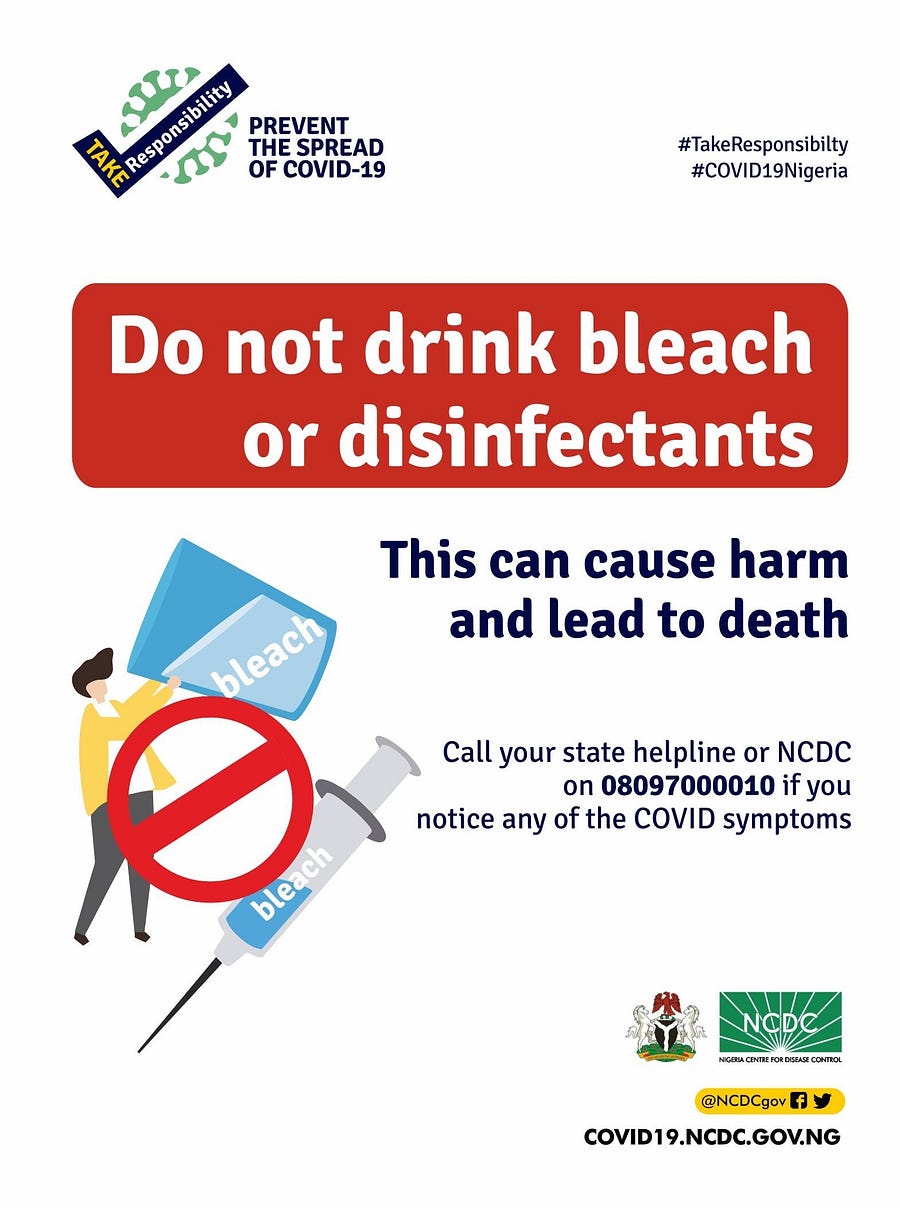
In April, the U.S. President, Donald Trump, suggested injecting disinfectant to kill coronavirus. Even though health experts and disinfectant manufacturers quickly warned citizens against injecting or ingesting disinfectants, it did not stop many from trying. Citing data released by the American Association of Poison Control Centers (AAPCC), TIME reported that there was a 121% increase in reported cases of accidental poisoning following Trump’s suggestion. Such a regular report on accidental poisoning is not readily available publicly in Nigeria which is probably why it may never be known how many Nigerians may have followed the US President’s advice. While it may be hard to believe that anyone would follow the President’s advice, what is evident, is that the messenger delivering a message is critical. This puts great responsibility on opinion leaders to ensure that they provide evidence-based information.
Misinformation from the pulpit
Nigeria is a highly religious country and it is well documented that many citizens trust Muslim and Christian clerics or other religious leaders more than the government. It is the reason why a pregnant woman may choose to give birth in a faith home, instead of a health facility. It is also the reason why a pregnant woman in need of an emergency caesarean section may refuse to have one because her pastor said she should give birth like a Hebrew woman. It is also the reason why a man living with HIV may stop taking his antiretroviral drugs because his pastor said he has been healed or a woman diagnosed with breast cancer will turn down a mastectomy and chemotherapy, applying anointing oil instead on the metastasized lump that may eventually put her life at risk.
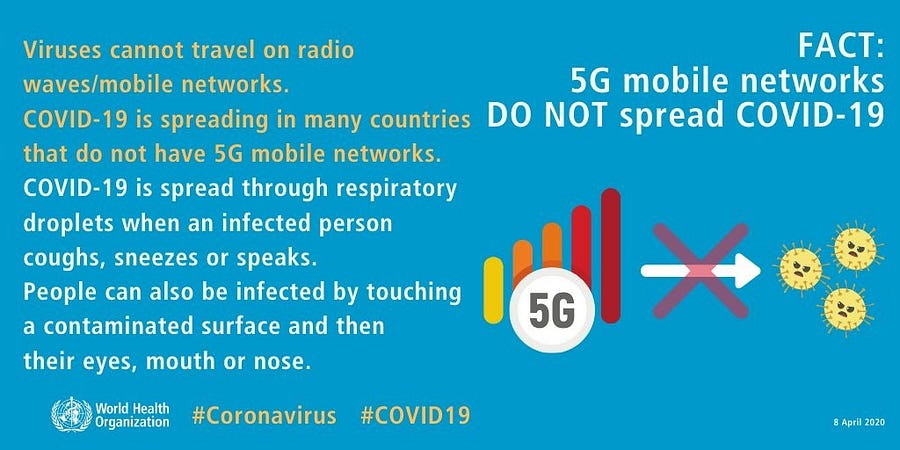
There was a huge social media buzz when Pastor Chris Oyakhilome, the charismatic leader of one of Nigeria’s major pentecostal churches, endorsed a theory connecting COVID-19 to 5G. It was clear in the aftermath that the local truth ecosystem was caught off guard and fumbled its way to respond. It emphasized the importance of spiritual leaders influence when it comes to public health information. It is also telling that there have not been any repercussions for the claim, which public health experts have declared false.
Hydroxychloroquine opens a can of misinformation worms
The global controversies around the use of hydroxychloroquine to treat COVID-19 brought to the fore the shaky nature of measures to prevent and address misinformation. And the controversy pervaded the medical world, with health colleagues taking sides on the veracity of claims made by Dr Stella Emmanuel.
I had an interesting exchange with a health colleague via direct message chat, where the colleague pointed out why they supported Dr Emmanuel’s claim, after they saw a Facebook post in which the author expressed disappointment at how many Nigerians are pushing unscientific claims regarding hydroxychloroquine. They said, “Dr Stella Emmanuel deserves to be hailed. I have been hailing her everywhere for the past few days on my own Facebook page and on other parts of social media. As a doctor myself for 40 years, I am in a position to know that she should be hailed.”
This and other comments from some Nigerian scientists and health practitioners seem to indicate that they find it acceptable for findings to be announced at press conferences before scientific validation through the usual peer-review process.
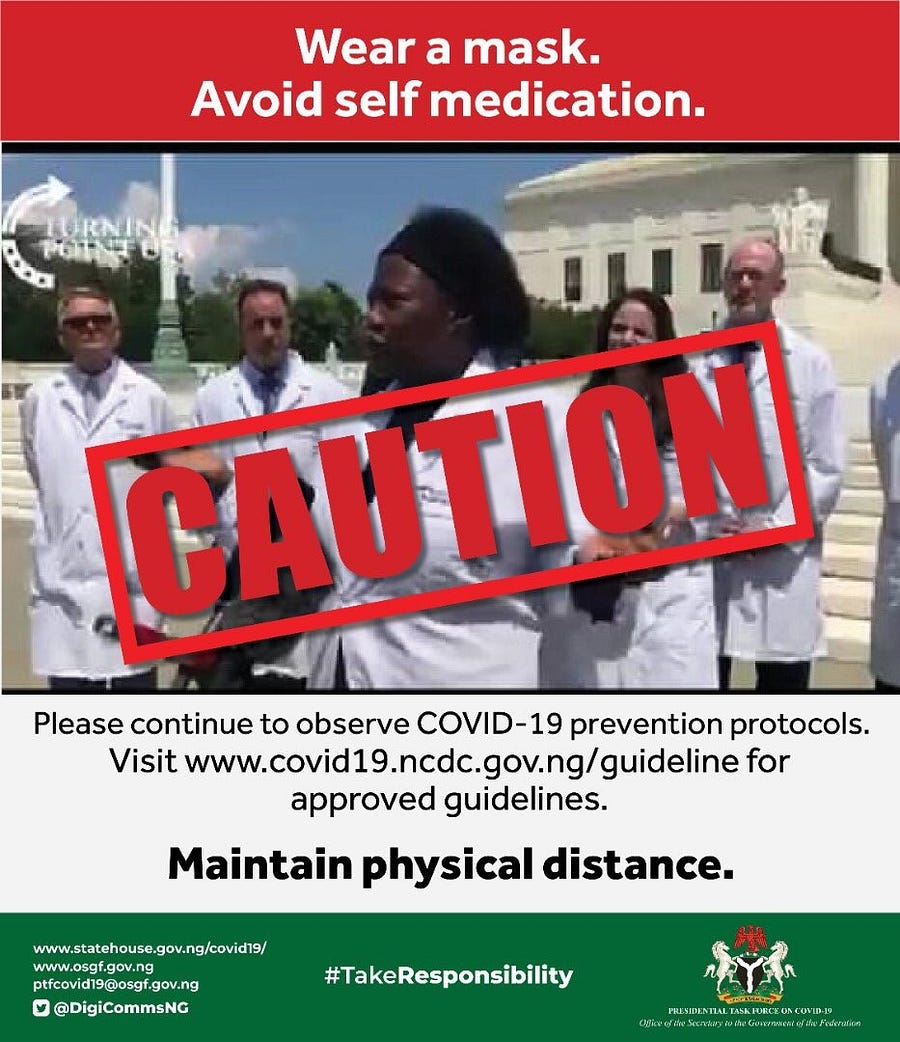
Attack on trust
The internet is democratic and anyone can create websites overnight, design a logo and start putting content online. The answer to this used to be directing people to reliable sources, but there has been a continuous attempt to discredit reputable news sources such that when you ask someone sharing stories from untrusted sources to provide same stories on widely trusted platforms, they often claim that a major conspiracy is underway to prevent people from knowing the truth and it involves the “fake news” media.
In other words, reliable sources cannot be trusted and as such, ludicrous claims will have to be accepted without minding the source’s numerous red flags. A Nigerian proponent of fake news attempted to convince people on social media that an openly shared article on Google Document is a peer-reviewed scientific publication that no trusted science journal would publish because it exposed the lies of the Big Pharma market.
In Nigeria, a similar trend is emerging on social media.
Every night, around 11:30 pm, the Nigeria Centre for Disease Control (NCDC) publishes daily figures for COVID-19 confirmed cases, as well as the number of patients discharged. A closer look at the comments under the nightly tweet during the early days of the pandemic showed many Twitter users made fun of the information and described the figures generated by the NCDC as estimates. Many Nigerians were and still remain sceptical about the existence of COVID-19. However, as the pandemic continued to spread and notable Nigerians began to die of COVID-19, some COVID-19 sceptics began to re-consider the existence of the virus.
Very few options
China has a larger population than Nigeria, yet it was able to shut down the initial epicentre of Wuhan to curb the spread of COVID-19. Now its economy is somehow on its way back as it is still supplying the much-needed tools such as PPEs to many African countries combating COVID-19. But Nigeria’s system of governance does not confer such totalitarian power and the country does not have the same economic resources as China. Therefore the lockdown experienced challenges as state governments struggled to meet the needs of citizens dependent on a daily wage to sustain themselves and their families.
Nigeria also has another problem, it has become very easy for misinformation to spread despite various efforts to address it, encouraging people to verify information through trusted sources like national public health institutes.
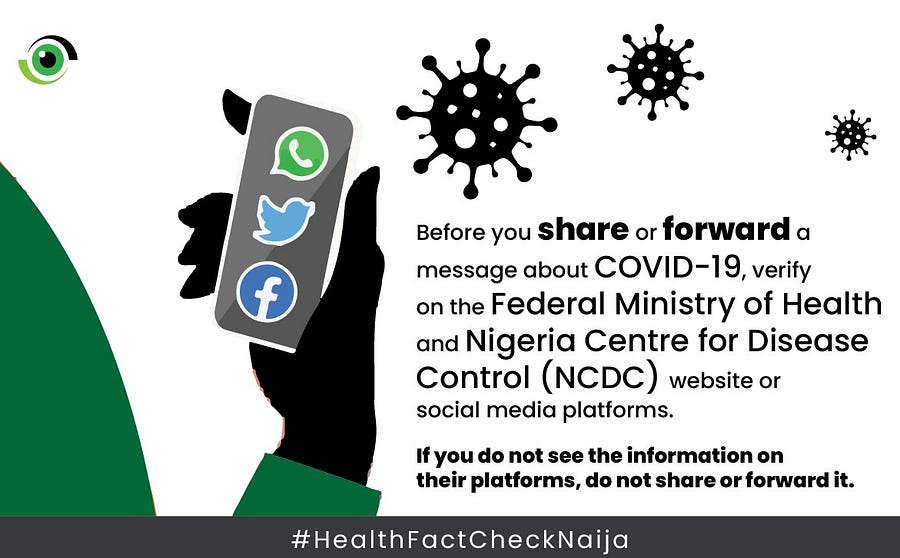
Even social media giants are doing their best to point their users to reliable sources of information on COVID-19, but misinformation seems to be spreading faster. Banning access to social media would seem tempting but freedom of information is a core human right, and social media platforms serve as a means of information dissemination by national public health institutes and major news outlets, so blocking them would be counterproductive.
Lessons from African counterpart nations
In Ghana, media houses such as Ghanaian Times are not standing on the fence. Its editorial page has been used to call out fake news on COVID-19. Senegal, South Africa and Mauritius were co-authors of a joint statement calling attention to infodemics in the context of COVID-19.
“We call on countries to take steps to counter the spread of such disinformation, in an objective manner and with due respect for citizens’ freedom of expression, as well as public order and safety. We reaffirm the importance of ensuring that people are accurately informed from trustworthy sources and are not misled by disinformation about COVID-19,” the joint statement read.
In their mini-review article, Bright Opoku Ahinkorah and colleagues suggested that the effective strategy against heightening public fear regarding misconstructions of the science and epidemiology of COVID-19 is the provision of accurate information that conveys consistently science-driven narratives. They recommended stringent measures including charging people responsible for the production and propagation of COVID-19 misinformation, with public deceit and made to face the law to serve as a deterrent to other potential culprits.
Since March 2020, Kenya has been arresting people who have spread fake news about COVID-19 using existing local laws. In addition, a radio presenter in Kenya is using the airwaves to bring vital facts to 217,000 residents of refugee camps in Dadaab. Lawsuits alone have not been enough, there is a need to directly educate and engage the general public and to identify, address and take action on COVID-19 misinformation. In South Africa, Media Monitoring Africa relaunched its Real 411 Platform to enable members of the public to report disinformation and other objectionable speech to a Digital Complaints Committee.
“Real411 has been up and running for just over four months and since the initial launch, we have received 622 complaints. Of these complaints, 601 have been reviewed, assessed, and appropriate action recommended, and taken,” a report published on August 10 stated. In Egypt, a podcast that is helping in fighting COVID-19 misinformation has caught the attention of the United Nations, it is also being used to deliver factual information on other issues. The media regulator in the North African country, the Supreme Council for Media Regulation (SCMR), has also blocked or limited access to a dozen news websites and social media accounts since early March for spreading rumours about the pandemic, although Reporters Without Borders called for more transparency about the regulator’s grounds for blocking websites.
Nigeria institutions making an effort to correct misinformation
Despite several attempts to address COVID-19 misinformation in Nigeria, a wide gap still exists in knowledge and understanding. The NCDC has used its social media platforms to debunk misinformation as well as issuing press releases to correct incorrect information and rumours. Other organisations like Africa Check and Nigeria Health Watch have sought to address misinformation. However, other government institutions should also play their part in providing additional avenues and innovatively open new channels to engage correct misinformation, especially during a pandemic when people are bombarded with information and misinformation — and at some point, it becomes difficult to decipher who to trust, and where to get trusted and reliable information from. This task isn’t only the responsibility of government institutions, but requires everyone to do their part — from religious leaders to medical professionals, debunking and fact-checking information before disseminating should rationally become everyone’s duty. It is an aggressive fight — and it entails using the various channels that misinformation merchants are leveraging on to spread misinformation.
If misinformation is being addressed from multiple fronts, and facts are being disseminated widely, truth stands a better chance of winning. Because in the face of the facts, misinformation crumbles.
What other misinformation around COVID-19 have you heard? How have you sought to debunk this misinformation? Let us know @nighealthwatch on Twitter. Use the hashtag #HealthFactCheckNaija


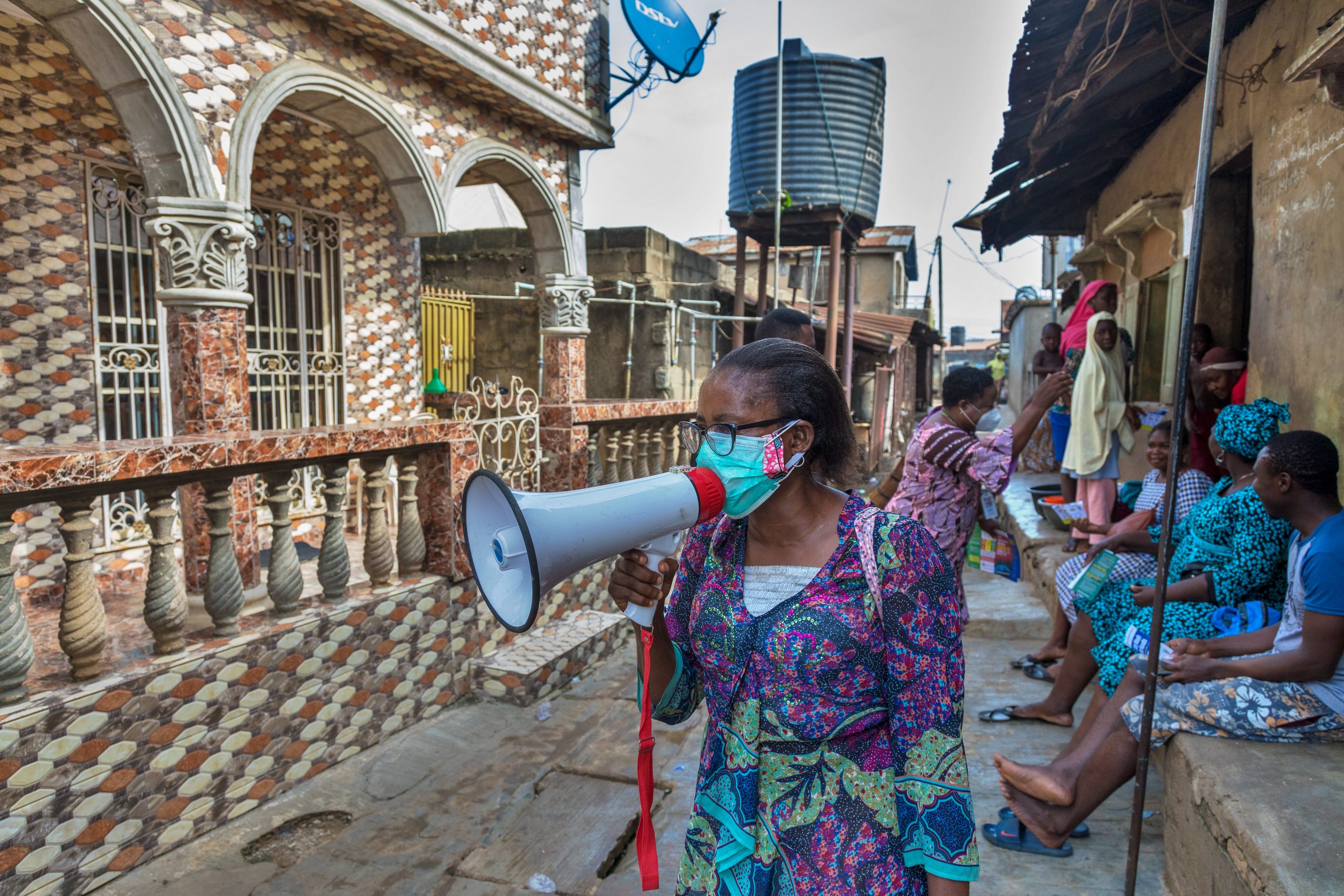

As usual, this is quality journalism from Nigeria Health Watch. The role of governments in addressing misinformation is vitally important. In some countries, heads of state are actually a major cause of misinformation. Several years ago HIFA and the New York Law School published a white paper that concluded that governments have a responsibility – under international hiuman rights law – to ensure access to reliable healthcare information for their people. http://www.hifa.org/sites/default/files/other_publications_uploads/Access_to_Health_Information_Under_Inter.pdf This same principle is (in my view) equally applicable to governments’ obligations with regard to protecting people from misinformation. Join the global discussion on misinformation on HIFA (Healthcare Information For All): http://www.hifa.org/hifa